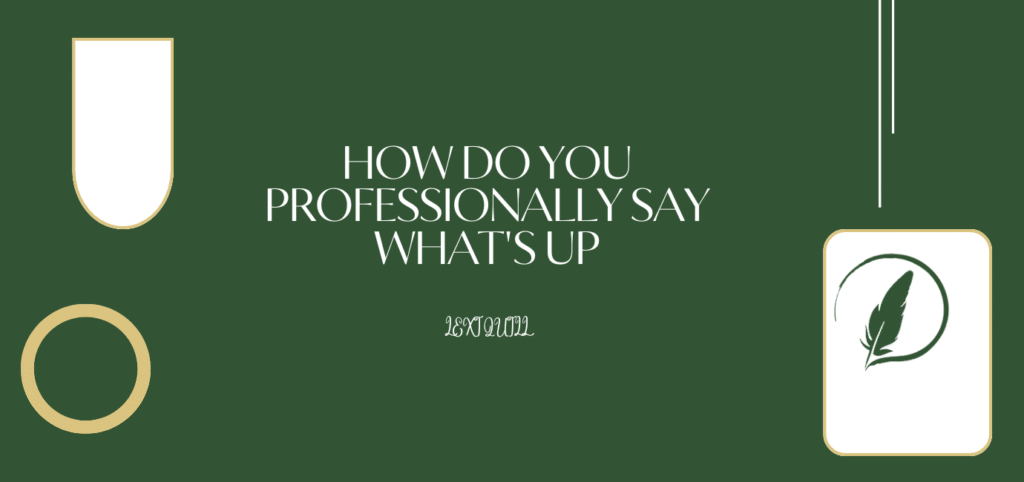In the modern workplace, communication is a crucial part of building credibility, fostering collaboration, and maintaining professionalism. Everyday phrases like “I’m hungry” might be acceptable among friends or in casual settings, but they can sound out of place in business environments, formal meetings, or professional emails. This article explores how to professionally say “I’m hungry”, helping professionals, students, and business individuals navigate workplace interactions with polished and context-appropriate language.
Whether you’re navigating a lunch meeting, hinting at a break during a long work session, or simply communicating a need with tact, using professional language can go a long way. Let’s explore some professional alternatives that not only convey your message clearly but also uphold a polished and workplace-appropriate tone.
Why Replace “I’m Hungry” with Professional Alternatives?
Using professional synonyms or business-appropriate language helps you:
- Maintain a respectful and polished tone
- Communicate effectively in mixed-formality settings
- Build a reputation for thoughtful, deliberate communication
- Avoid language that may be perceived as too casual or distracting
Now, let’s dive into some practical and professional alternatives to the phrase “I’m hungry.”
Option 1: “Shall We Take a Break for a Meal?”
A Collaborative and Polished Approach
This phrase shifts the focus from personal hunger to a shared, considerate suggestion. It’s especially useful in meetings or collaborative sessions when it’s appropriate to suggest a break.
When to Use:
- During team meetings running into meal times
- When you sense others may feel the same way
- When leading or moderating a discussion
Example:
“We’ve covered a lot of ground—shall we take a break for a meal before continuing?”
Related Business Synonyms:
- “Pause for lunch”
- “Break for refreshments”
Option 2: “Would Now Be a Good Time to Eat?”
Polite and Timely Inquiry
This alternative keeps the tone polite and deferential. It’s appropriate when you’re seeking approval or checking timing, especially in situations involving senior colleagues or clients.
When to Use:
- When working with someone more senior
- When proposing a break without assuming
Example:
“We’ve been working for a while—would now be a good time to eat?”
Professional Synonyms:
- “Grab a bite”
- “Pause for sustenance” (formal)
Option 3: “I Could Use a Meal Break”
Direct Yet Professional
This option is a straightforward and business-friendly way to communicate your need. It’s direct without being overly casual and works well in internal team settings.
When to Use:
- Internal meetings with peers or team members
- Long project sessions or planning sprints
Example:
“I think I could use a meal break before we jump into the next section.”
Related Phrases:
- “Take a lunch break”
- “Recharge with a meal”
Option 4: “Let’s Schedule a Lunch Break”
Structured and Managerial Tone
This phrase is great for those in leadership or coordination roles. It communicates foresight and care for group well-being while addressing hunger.
When to Use:
- When managing a workshop or group session
- During planning of an agenda or event
Example:
“Let’s schedule a lunch break around 12:30 so we all have time to recharge.”
Professional Synonyms:
- “Allot time for a meal”
- “Include a meal break in the schedule”
Option 5: “I’m Ready for Lunch”
Polite and Clear Declaration
This version is more casual than others but still workplace-appropriate, especially when talking to familiar colleagues. It maintains clarity without sounding too personal.
When to Use:
- In informal team settings
- One-on-one chats with colleagues
Example:
“If you’re free, I’m ready for lunch now.”
Alternate Phrasing:
- “Lunch sounds good about now”
- “It’s a good time to eat”
Option 6: “Let’s Refuel Before We Continue”
Energetic and Motivational
A more metaphorical expression, this phrase conveys the need for a break in a light and motivational tone. It keeps the conversation energized and avoids sounding mundane.
When to Use:
- During intense brainstorming or creative sessions
- In energetic, informal but professional settings
Example:
“Great progress so far—let’s refuel before we dive into the next part.”
Business Synonyms:
- “Recharge with a bite”
- “Pause for refreshments”
Option 7: “Can We Pause for a Quick Lunch?”
Friendly and Considerate
This phrase communicates your need while also being considerate of the group’s agenda. It’s a good balance of polite and assertive.
When to Use:
- When participating in group projects
- In day-long sessions or meetings
Example:
“Can we pause for a quick lunch and then resume in 30 minutes?”
Professional Variants:
- “Take a brief intermission for lunch”
- “Step out for a short meal”
Why Professional Language Matters
Adopting professional synonyms for everyday phrases like “I’m hungry” serves more than just etiquette—it supports:
- Clarity: Avoids misinterpretations or distractions.
- Credibility: Shows maturity and awareness of professional norms.
- Efficiency: Helps navigate social and hierarchical dynamics smoothly.
- Tone Management: Prevents overly casual expressions in formal contexts.
Small language shifts can make a big impact on how you’re perceived in a professional environment.
Conclusion:
Choosing how to professionally say “I’m hungry” is about more than just finding fancy words—it’s about expressing yourself with clarity, courtesy, and confidence. From structured suggestions like “Let’s schedule a lunch break” to polite inquiries like “Would now be a good time to eat?”, the alternatives provided in this guide help you navigate workplace communication with ease and professionalism.
By integrating these phrases into your daily vocabulary, you’ll enhance your ability to communicate needs tactfully and assertively. So the next time hunger strikes during a meeting or long work session, remember—there’s a professional way to say it.








